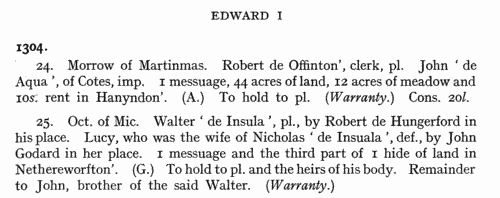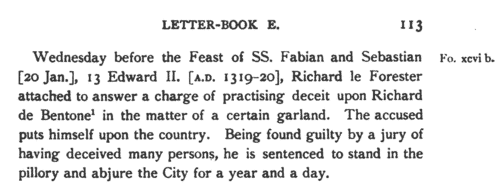Drokenesford Surname Ancestry ResultsOur indexes 1000-1999 include entries for the spelling 'drokenesford'. In the period you have requested, we have the following 13 records (displaying 1 to 10): Buy all | | | Get all 13 records to view, to save and print for £52.00 |
These sample scans are from the original record. You will get scans of the full pages or articles where the surname you searched for has been found. Your web browser may prevent the sample windows from opening; in this case please change your browser settings to allow pop-up windows from this site. Grantees of offices, commissions and pardons
(1272-1281)
The Patent Rolls are the Chancery enrolments of royal letters patent. Those for the 1st to the 9th years of the reign of king Edward I (29 November 1272 to 17 November 1281) were edited for the Public Record Office by J. G. Black, and published in 1901. The main contents are royal commissions and grants; ratifications of ecclesiastical estates; writs of aid to royal servants and purveyors; and pardons. DROKENESFORD. Cost: £2.00.  | Sample scan, click to enlarge

| Close Rolls
(1302-1307)
The close rolls of the 31st to 35th years of the reign of king Edward I, that is to the day of his death (7 July 1307), record the main artery of government administration in England, the orders sent out day by day to individual officers, especially sheriffs of shires: they are an exceptionally rich source for so early a period. In amongst this official material, the rolls were also used as a way of recording many acknowledgments of private debts and contracts between individuals. Most of the contents relate to England, but there are also entries concerning Wales, Scotland, Ireland and the English possessions in France.DROKENESFORD. Cost: £4.00.  | Sample scan, click to enlarge

| Freemen and citizens of London
(1291-1309)
Letter Book C of the City of London contains enrolments of recognizances between inhabitants, particularly citizens, for sums of money lent or due; grants of pieces of land or property; and various records relating to the city administration, minor infractions, &c. The text was edited by Reginald R. Sharpe and printed by order of the Corporation of the City of London in 1901.DROKENESFORD. Cost: £4.00.  | Sample scan, click to enlarge

| Grantees of offices, commissions and pardons
(1317-1321)
The Patent Rolls are the Chancery enrolments of royal letters patent. Those for the 11th to the 14th years of the reign of king Edward II (8 July 1317 to 7 July 1321) were edited for the Public Record Office by G. F. Handcock, and published in 1903. The main contents are royal commissions and grants; ratifications of ecclesiastical estates; writs of aid to royal servants and purveyors; and pardons. Most extensive are the commissions of oyer and terminer to justices to investigate complaints about specific crimes and wrongs in particular counties.DROKENESFORD. Cost: £2.00.  | Sample scan, click to enlarge

| Chancery Warrants
(1244-1326)
Warrants were issued by the kings of England to the royal chancery: most of these warrants led to further proceedings which are recorded on the Charter Rolls, Patent Rolls, Fine Rolls, Close Rolls or the Inquisitions: but archivists have identified a large number of warrants for which there are no such equivalent records, and those for the reigns of Edward I and Edward II are gathered here. Most of the entries relate to England and Wales, but with occasional items referring to Ireland and the English possessions in France.DROKENESFORD. Cost: £4.00.  | Sample scan, click to enlarge

| Wiltshire Feet of Fines
(1273-1326)
Pedes Finium - law suits, or pretended suits, putting on record the ownership of land in Wiltshire. These abstracts were prepared by R. B. Pugh for the Wiltshire Archaeological and Natural History Society Records Branch and published in 1939, under the title 'Abstracts of Feet of Fines relating to Wiltshire for the Reigns of Edward I and Edward II'. Pugh made abstracts not only of the Wiltshire feet of fines for the two reigns but also of the Wiltshire content of those feet of fines covering two or more counties, which are archived separately under 'Divers Counties'. Each entry starts with a sequential number within the regnal year. The date then given is the date on which the original writ was returnable in court, rather than the date on which proceedings were completed. The dates do not fall on the quarter days themselves (Michaelmas, Hilary, Easter and Trinity) but on the octave (oct., 7 days after), quindene (quin., 14 days after), or three weeks later, &c. Then there is the name of the party initiating the action (X: pl., plaintiff, or dem., demandant), and then that of the defendant (def.) or impedient (imp.) (Y). Then there is a summary description of the land involved; and then a code indicating the precise nature of the action. Seven of these (A. to G.) are variants on the theme of X having acknowledged the premises to be the right of Y; but H. indicates a simple complete grant from X to Y, complete with actual transfer of possession. In cases B., C., E. and G. it is X, not Y, on whom the property is settled. If there is a warranty clause, or a more involved settlement, the details are given.DROKENESFORD. Cost: £4.00.  | Sample scan, click to enlarge

| Clerks and Clergy in Cornwall and Devon
(1307-1326)
The register of bishop Walter de Stapeldon of Exeter, containing general diocesan business, but in particular including ordination lists for monks and clergy. Only a small proportion of the clerks went on to acquire benefices and remained celibate. LatinDROKENESFORD. Cost: £6.00.  | Sample scan, click to enlarge

| Freemen and citizens of London
(1314-1337)
Letter Book D, or the Liber Rubeus (Red Book) of the City of London contains enrolments of recognizances between inhabitants, particularly citizens, for sums of money lent or due; grants of pieces of land or property; and various records relating to the city administration, minor infractions, &c. In addition, this volume includes the record of admissions to the freedom of the city by redemption (payment of a sum of money), and the binding and discharge of apprenticeships for the same period. Without freedom of the city - which could only be gained by birth (patrimony), apprenticeship or servitude, or by redemption - no man could open a shop, sell goods retail, or even reside within the city walls (except for a limited time, and then only in the houses of freemen and under frankpledge). The text was edited by Reginald R. Sharpe and printed by order of the Corporation of the City of London in 1902.
DROKENESFORD. Cost: £4.00.  | Sample scan, click to enlarge

| Inhabitants of London
(1314-1337)
Letter Book E of the City of London contains enrolments of recognizances between inhabitants, particularly citizens, for sums of money lent or due; grants of pieces of land or property; and various records relating to the city administration, minor infractions, &c.
DROKENESFORD. Cost: £4.00.  | Sample scan, click to enlarge

| Close Rolls
(1333-1337)
The close rolls of the 7th to 10th years of the reign of king Edward III, that is from 25 January 1333 to 24 January 1337, record the main artery of government administration in England, the orders sent out day by day to individual officers, especially sheriffs of shires: they are an exceptionally rich source for so early a period. In amongst this official material, the rolls were also used as a way of recording many acknowledgments of private debts and contracts between individuals. Most of the contents relate to England, but there are also entries concerning Wales, Scotland, Ireland and the English possessions in France: particularly Scotland, where the king was campaigning during this period. This calendar was prepared by A. B. Hinds of the Public Record Office and published in 1898.DROKENESFORD. Cost: £4.00.  | Sample scan, click to enlarge

|
| 1 | 2 |  |
Research your ancestry, family history, genealogy and one-name study by direct access to original records and archives indexed by surname.
|












